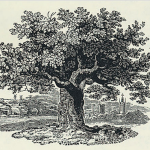I have written a few articles recently concerning the neighborhood of Bowne Station (“The Daybooks of Dr. Bowne,” “The Bowne Homestead,” “Bowne Station” and “The Bosenbury and Taylor Graveyards”), and have frequently come across references to the first settlers in that area, one Jacob Moore and his wife, Apolonia Amy Moret. Just when I thought I had published all articles by Egbert T. Bush and Jonathan M. Hoppock pertaining to the early history of the Moore family in Amwell, another one turned up. Actually, two articles, “Old Farms in Old Hunterdon” and “Farewell Relic of Another Age.”
Search Results for: Stout
The Two John Barbers
In the early 1860s, two men named John Barber got involved on opposite sides of the question – should the country support Lincoln’s prosecution of the Civil War, or should it not?1
Ellicott’s Diary, July 1863, part one
The Civil War Diary of Benjamin H. Ellicott continued
As the weather heated up in the summer of 1863, so did the Civil War, with the siege of Vicksburg finally completed, and then the momentous Battle(s) at Gettysburg. Benjamin Ellicott, writing from his home in Baltimore, struggled to make sense of what was happening, in an age when communications were still quite primitive, compared to our instant access to events. Despite telegrams and the telegraph, news was hard to get, and reliable news even harder. Ellicott’s journal shows us how different life is for civilians in a civil war compared to a war fought overseas, on someone else’s territory.1
Pine Hill Cemetery, Revisited
Pine Hill Cemetery is one of the most interesting of the old family burial grounds in Hunterdon County. I have written about it before, in an article that listed the known graves with some biographical information. But I had just scratched the surface; there is so much more to be said.
Old Barns Were Built For The Ages
Processes of Lining, Scoring, Boring and Hewing Described
‘The Big Thrashing Floor’
by Egbert T. Bush, Stockton, N. J.
published in the Hunterdon County Democrat, July 17, 1930
There is no genealogy in this article; it is simply about how to build a barn.
The Democratic Club of Delaware Twp, 1863
The most recent issue of the Hunterdon Historical Newsletter (vol. 51, no. 2) includes an article by me on the Democratic Club of Delaware Township. I thought the story an important one, so, for the benefit of those who do not subscribe to the newsletter, I am also publishing it here on my website, with a couple additional notes.
(I do hope you will consider becoming a member of the Hunterdon County Historical Society, which includes a subscription to the newsletter. It’s a great way to support the preservation of Hunterdon County history. Here’s their website: Hunterdon History.)
The Civil War in 1862
as seen through Benjamin H. Ellicott’s eyes
This post provides transcriptions of Benjamin H. Ellicott’s notes on the Civil War from March to December 1862. (I have kept Ellicott’s spelling, and inserted questions marks for words I can’t read.) For most of this time, Ellicott and his family were living in Locktown, New Jersey. Baltimore was their home, but they left it in 1861 after the attack on Fort Sumter. The family returned to Baltimore on September 24, 1862, and remained there until 1863, when they resettled in Hunterdon County.
“California” in Franklin Township
Elisha Warford
In his diary, Benjamin Ellicott made several references to his father-in-law, Elisha Warford. Warford is a legendary figure in the history of the Locktown-Croton vicinity, so it seems appropriate to publish Mr. Bush’s recollections of the man. He was a controversial figure, extremely wealthy, and extremely litigious. He never hesitated to take his debtors to court, as the papers in the Warford Collection at the Hunterdon County Historical Society will attest. Warford was a difficult personality that Mr. Bush managed to write about without casting aspersions. But then Egbert T. Bush was always a gentleman. As usual, I will take the liberty of making comments and annotations.
How Locktown Got Its Name
Back in February, I published an article on the cemetery connected with the Locktown Baptist church. Previously I have written about the Baptist congregation here as well as the Locktown Christian Church and its Cemetery. It seems appropriate now to include Mr. Bush’s own history of this neighborhood, which was published in the Hunterdon Democrat, on May 22, 1930. Along with the churches, Mr. Bush discusses the school house, the distillery and the Locktown Hotel, which began its life as a humble tavern, and also some of the old families, like the Chamberlins, Heaths, Lairs, Rittenhouses, Smiths and Suttons. Photographs in this article were provided by Paul Kurzenberger.
